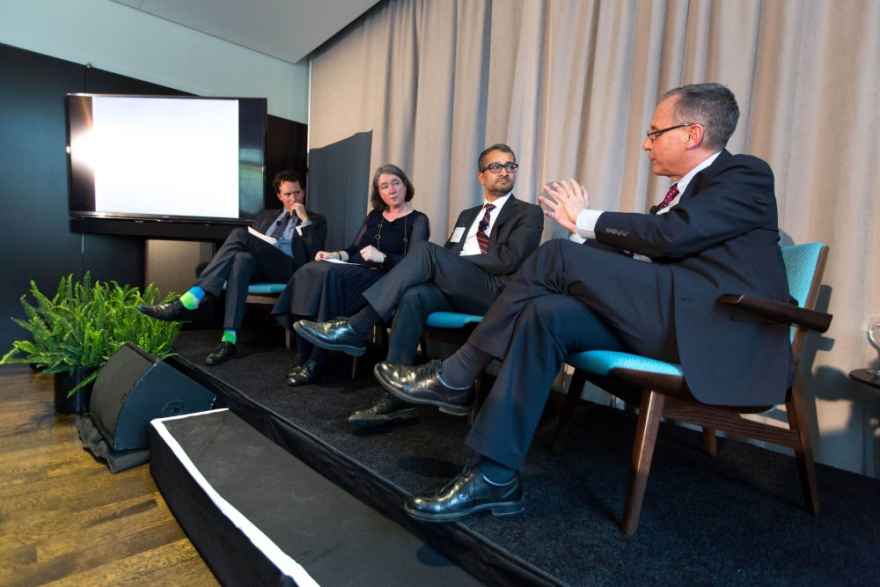Neubauer Collegium Celebrates Opening of New Home at 5701 S. Woodlawn

The following article originally appeared in UChicago News on 21 April 2015.
In a milestone for the ambitious research initiative, the Neubauer Collegium for Culture and Society celebrated the opening of its permanent home at 5701 S. Woodlawn Ave. on April 20 with remarks by University of Chicago leaders and a panel discussion featuring Neubauer Collegium Faculty Fellows.
The Neubauer Collegium’s inaugural exhibition, “No Longer Art: Salvage Art Institute” will open on Thursday, April 23 in the new space. The exhibition, curated by Jacob Proctor, highlights salvaged artworks that have been removed from circulation as a result of accidental damage.
The renovated building supports the Neubauer Collegium’s vision and ideals for collaborative research in the humanities and social sciences. Originally built in 1930, the Neo-Gothic building has been updated to include offices and workstations for researchers, conference and meeting rooms, larger spaces for gatherings and public events, and a space for exhibitions.
These changes reflect the Neubauer Collegium’s mission and make it a destination for scholars around the world, said Jonathan Lear, the Roman Family Director of the Neubauer Collegium.
“From its founding, the Neubauer Collegium has supported research that cuts across disciplinary boundaries and brings scholars together from around the world in search of new approaches to questions in the humanities and social sciences,” Lear said. “Now, we have a building that facilitates the ambitious research of our faculty and visiting fellows by allowing them to work and think together in a shared space.”
At the opening celebration, faculty and administrators spoke of the remarkable progress of the Neubauer Collegium. “I know of nothing else that has had this kind of enormous, immediate and transformative impact in the humanities,” said Martha Roth, dean of the Division of the Humanities and the Chauncey S. Boucher Distinguished Service Professor of Assyriology.
During the panel discussion, faculty members involved in Neubauer Collegium projects praised the intellectual freedom and flexibility it affords. David Nirenberg, dean of the Social Sciences and the founding director of the Neubauer Collegium, said the building was designed to reflect that sense of openness.
“At every stage of the project, the question animating us was ‘How does space affect the possibility of thought?’” he said. “I trust that you will agree that the result is beautiful, and I cannot wait to see the revelations and the discoveries that will emanate from this space into the world.”
The University purchased 5701 S. Woodlawn in 2011, and hired Kliment Halsband Architects to undertake the renovation of the 16,000-square-foot space. The adaptive reuse preserved many of the historic elements of the building, including the limestone façade, floor-to-ceiling wood paneling, staircases, and vintage light fixtures and fireplaces. In addition to the interior renovations, the west side of the building now features French doors opening onto a new outdoor terrace facing Woodlawn Avenue.
“Through large open spaces, and through transparency even when there are enclosed offices, the idea is to encourage both planned and spontaneous interactions,” said University Architect Steve Wiesenthal. “The entire ground floor is about welcoming and sharing ideas, and connecting people formally or informally.”
The Neubauer Collegium supports innovative and collaborative research projects led by UChicago faculty, hosts visiting fellows from around the world and pioneers efforts to engage a wider public in humanistic scholarship. The Neubauer Collegium has supported 42 faculty research projects led by more than 100 UChicago faculty fellows since its founding in 2012.
It is named for trustee Joseph Neubauer, MBA’65, and his wife Jeanette Lerman-Neubauer in honor of their $26.5 million gift to the University—among the largest gifts in support of the humanities and social sciences in the institution’s history.
